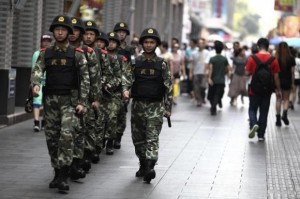Suicide Bomber Kills Up to 8 in Xinjiang, Radio Free Asia Reports
New York Times, 17 February 2015
By Michael Forsythe – A suicide bomber in the volatile Chinese region of Xinjiang killed as many as eight people last Friday when he grabbed a police officer and set off an explosive device attached to his body, according to a report by Radio Free Asia.
The young man, a member of the Uighur ethnic group, set off the device in Hotan Prefecture, an impoverished part of Xinjiang near the border with India and Pakistan, the report said. In addition to the deaths, at least seven people remained hospitalized, Radio Free Asia, a news service funded by the United States government, reported, citing interviews with a hospital worker and a shopkeeper.
The account could not be independently confirmed, and the Chinese state news media had yet to report on the incident.
In recent years, Xinjiang, in China’s far west, has been the scene of many bloody clashes between Uighurs, a Turkic group that makes up about 40 percent of the region’s population, and the ethnic Han who make up China’s majority. Violence between Uighurs and Han in Xinjiang’s capital, Urumqi, in July 2009 killed nearly 200 people.
Some of the Muslim Uighurs have embraced radical forms of Islam, and many resent the political and economic domination of their homeland by Han. Some Uighurs want to set up an independent East Turkestan.
Radio Free Asia reported that the attack Friday took place in Guma County, known as Pishan in Chinese. A person who answered the telephone at the Pishan County Public Security Bureau said he had no information about the incident, and a person at the Pishan County People’s Hospital said, “We’re not allowed to answer your question, sorry.” Neither person would give his name.
Hotan Prefecture, part of the Uighur heartland in southwestern Xinjiang, is one of the region’s poorest areas. In recent years, it has been the scene of several deadly clashes between Uighurs and the police. In July 2011, 18 people in Hotan died when rioters stormed a police station. In recent years, such violence has spilled across Xinjiang’s borders to other regions of China.
Last March 1, a group of knife-wielding assailants went on a rampage in a crowded railway station in Kunming in southwestern China, killing 29 people and wounding more than 140. The Chinese government said the attackers were Uighurs. The following month, assailants armed with explosives and knives killed at least three people and wounded 79 outside a train station in Urumqi, an attack the government also attributed to Uighur separatists.
The Urumqi attack in April coincided with the end of a visit to the region by President Xi Jinping. During Mr. Xi’s two years as China’s top leader, his government has taken an increasingly uncompromising stance toward Uighurs who advocate anything that strays from total support of the Communist Party and its policies.
Ilham Tohti, a Uighur economist fluent in Chinese who taught at a university in Beijing, was sentenced to life in prison last September for inciting separatism. Mr. Tohti had argued that China’s policy of repressing an entire ethnic group in a bid to curb the attacks was counterproductive and led to more violence.


